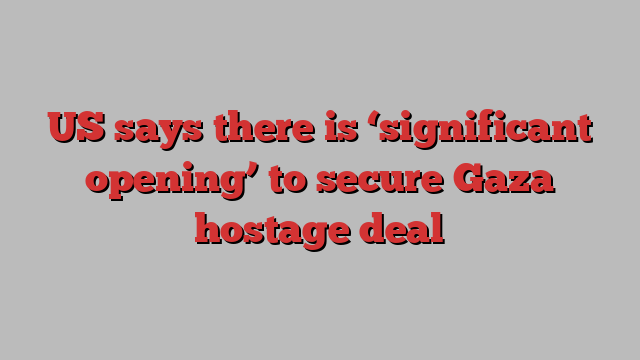
Unlock the Editor’s Digest for free
Roula Khalaf, Editor of the FT, selects her favourite stories in this weekly newsletter.
The US believes there is a “significant opening” to finalise a deal between Israel and Hamas to halt the nine-month war in Gaza and secure the release of Israeli hostages held in the strip, according to a senior administration official.
Speaking after US President Joe Biden held a 30-minute phone call with Israeli Prime Minister Benjamin Netanyahu on Thursday, the official said “we have had a breakthrough on a critical impasse”.
The official cautioned that a deal was not “going to come together in a period of days”, but added that “we do believe there is a pretty significant opening here”.
The sudden spurt of optimism came after Hamas submitted a response to the mediators’ latest proposal. There have, however, been previous periods of optimism that have been dashed by disputes between Israel and Hamas over the key terms .
Mediators from the US, Qatar and Egypt have for months sought to negotiate a deal between the warring parties that would lead to a three-phase agreement, beginning with an initial six-week pause in hostilities in Gaza and the release of women, including Israeli soldiers, the elderly and the wounded held captive in the besieged strip.
This would be followed by what mediators hope would be an extended ceasefire, effectively ending the war, during which the remaining hostages would be freed.
Israel would release Palestinian prisoners in exchange for the hostages, allow more aid into the strip and for displaced Gazans to return to their homes across the enclave, including the north.
The US and the other mediators believe a hostage deal is the most realistic way to end the war and de-escalate regional tensions, particularly the almost daily cross-border clashes between Israel and Hizbollah, the Iranian-backed Lebanese militant movement.
Mediators last thought they were close to a deal in May, but those talks stalled with disputes over the details as Hamas insisted that any agreement include guarantees that the arrangement would end with a permanent ceasefire and Israel withdrawing its troops from Gaza.
Netanyahu has repeatedly rejected the notion that a hostage deal alone would end the war. That month, he pressed ahead with an offensive on the southern Gazan city of Rafah, which was home to more than 1mn displaced people, despite opposition from the US and Israel’s other western allies.
He also faces pressure from far-right allies, who are crucial to the survival of his ruling coalition, not to end the offensive in Gaza or make concessions to Hamas after the Palestinian group’s October 7 attack triggered the war.
However, Israeli military officials have publicly said a deal with Hamas is the best way to ensure the safe return of the remaining hostages, believed to number about 120, some of whom are dead.
They have also questioned Netanyahu’s vow to eradicate Hamas, saying it is impossible to destroy the group, citing its militant ideology and roots in Palestinian society.
Israel said on Thursday that it would send negotiators to Qatar to resume negotiations.
But an Israeli official reiterated that the conflict would not end until Israel’s war goals — which include freeing the hostages and destroying Hamas — had been met.
Still, the US official said this stage of the talks “feels similar” to the “end game” of the process that secured a week-long halt to hostilities in November.
That deal, however, was less complex and ambitious as it was temporary and was focused on mothers and children, not Israeli soldiers held by Hamas, which have a far higher value to the militant group.